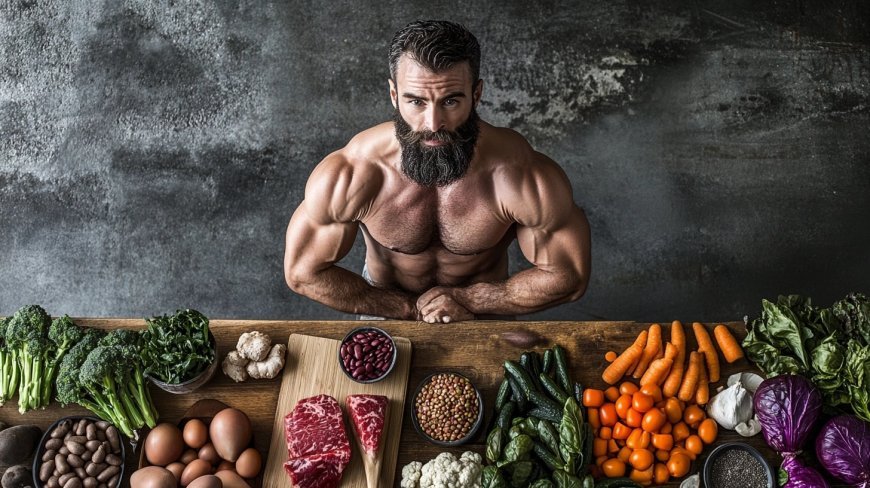Nutrition for Specific Lifestyles: Athletes, Seniors, and Vegans

Nutrition is not one-size-fits-all. Different lifestyles and stages of life have distinct nutritional needs, and tailoring your diet to suit these specific needs can make a significant difference in your health and well-being. Whether you're an athlete pushing your body to its limits, a senior aiming to stay active and healthy as you age, or a vegan committed to a plant-based lifestyle, it's essential to understand how to fuel your body correctly.
This guide provides tailored nutrition advice for athletes, seniors, and vegans, helping each group make informed choices and optimize their diet for their unique needs.
1. Nutrition for Athletes: Fueling Performance and Recovery
Athletes have unique nutritional needs due to the physical demands of their training and competition. Proper nutrition is crucial for enhancing performance, building muscle, and supporting recovery. An athlete's diet must focus on balancing carbohydrates, protein, and fats while ensuring adequate hydration and nutrient intake.
A. Macronutrients for Athletes
-
Carbohydrates: The Primary Energy Source
Function:
Carbohydrates are essential for athletes because they provide the body with glycogen, the main source of fuel for high-intensity and endurance activities. Maintaining adequate glycogen stores is critical for stamina, peak performance, and quick recovery.Recommended Intake:
Athletes should consume 45-65% of their daily calories from carbohydrates. For endurance events, intake may need to be increased to ensure that glycogen stores are adequately replenished.Sources of Healthy Carbohydrates:
- Whole grains (brown rice, oats, quinoa)
- Fruits (bananas, berries, oranges)
- Vegetables (sweet potatoes, carrots, spinach)
- Legumes (beans, lentils, chickpeas)

-
Protein: Essential for Muscle Repair and Growth
Function:
Protein plays a critical role in repairing muscle tissues and promoting growth, especially after intense physical activity. Athletes need a consistent supply of amino acids to stimulate muscle protein synthesis and prevent muscle breakdown.Recommended Intake:
Athletes should aim for 1.2 to 2.0 grams of protein per kilogram of body weight per day. This range varies based on the type and intensity of training. For those engaging in strength training, the higher end of the range may be beneficial.Sources of Healthy Protein:
- Lean meats (chicken, turkey)
- Fish (salmon, tuna)
- Eggs and dairy products (Greek yogurt, cottage cheese)
- Plant-based sources (tofu, tempeh, legumes, quinoa)
-
Fats: A Source of Long-Lasting Energy
Function:
Fats are crucial for athletes as they provide a concentrated source of energy, particularly during low-intensity, prolonged activities. They also aid in the absorption of fat-soluble vitamins.Recommended Intake:
Athletes should aim for 20-35% of their daily calorie intake from healthy fats. Including fats in meals also helps sustain energy levels between workouts.Sources of Healthy Fats:
- Avocados
- Nuts and seeds (almonds, chia seeds, flaxseeds)
- Olive oil and coconut oil
- Fatty fish (mackerel, sardines)
B. Hydration for Athletes
Importance:
Hydration is critical for athletes, as even mild dehydration can impair performance, reduce endurance, and hinder recovery. Electrolytes such as sodium, potassium, and magnesium are also essential for maintaining fluid balance.
Hydration Tips:
- Water: Drink water before, during, and after workouts to stay hydrated.
- Sports Drinks: For workouts lasting longer than an hour, consider a sports drink with electrolytes to replenish lost minerals.
- Daily Intake: Athletes should aim for at least 3-4 liters of fluid per day, and more if they are training in hot or humid conditions.
C. Timing Nutrition for Optimal Performance
-
Pre-Workout Nutrition:
- Carbohydrates: Eat a meal rich in complex carbohydrates 2-3 hours before exercising (e.g., oatmeal with banana and almond butter) to ensure glycogen stores are topped up.
- Small Snack: A light snack with easily digestible carbs, like a banana or energy bar, 30-60 minutes before a workout can help boost energy.
-
Post-Workout Nutrition:
- Protein and Carbohydrates: Consume a meal or snack containing both protein and carbs within 30-60 minutes of finishing your workout. A protein shake with fruit or a chicken sandwich on whole-grain bread can help replenish glycogen and repair muscles.
- Rehydration: Drink plenty of water or a recovery drink that includes electrolytes to restore fluid levels.

2. Nutrition for Seniors: Supporting Health and Vitality as You Age
As we age, our bodies undergo changes that impact nutritional needs. Seniors often require fewer calories, but they need more of certain nutrients to support bone health, immune function, and muscle maintenance. Proper nutrition helps seniors stay active, maintain independence, and reduce the risk of chronic diseases.
A. Macronutrient Needs for Seniors
-
Protein: Preventing Muscle Loss
Importance:
As we age, the risk of sarcopenia (age-related muscle loss) increases. Protein intake becomes even more critical for preserving muscle mass, strength, and function. Consuming adequate protein helps support mobility and reduces the risk of falls.Recommended Intake:
Seniors should aim for 1.0 to 1.2 grams of protein per kilogram of body weight per day. For those with health conditions or who are less active, higher amounts may be recommended to counter muscle loss.Sources of Protein:
- Lean meats and fish
- Eggs and dairy (low-fat milk, Greek yogurt)
- Plant-based options (lentils, beans, tofu, nuts)
-
Calcium and Vitamin D: Building Strong Bones
Importance:
Calcium and Vitamin D are essential for bone health. As we age, the body becomes less efficient at absorbing calcium, increasing the risk of osteoporosis. Vitamin D helps the body absorb calcium effectively.Recommended Intake:
- Calcium: Seniors should aim for 1,200 mg per day.
- Vitamin D: Recommended intake is 800-1,000 IU per day, either from foods or supplements.
Sources:
- Calcium: Dairy products, fortified plant milks, leafy greens, almonds.
- Vitamin D: Fatty fish (salmon), egg yolks, fortified cereals, and exposure to sunlight.
-
Fiber: Supporting Digestive Health
Importance:
Fiber is important for maintaining digestive health, preventing constipation, and promoting regular bowel movements. It also helps manage blood sugar levels and lower cholesterol.Recommended Intake:
Seniors should aim for 25-30 grams of fiber per day.Sources of Fiber:
- Fruits and vegetables (apples, berries, carrots)
- Whole grains (oats, quinoa, brown rice)
- Legumes (lentils, beans)
B. Hydration for Seniors
Importance:
Older adults often experience a reduced sense of thirst, which can lead to dehydration. Staying hydrated is important for regulating body temperature, supporting cognitive function, and preventing kidney issues.
Tips for Staying Hydrated:
- Water: Drink 8-10 cups of water per day, even if you don't feel thirsty.
- Hydrating Foods: Include hydrating foods like watermelon, cucumber, and broth-based soups in your diet.
- Herbal Teas: Enjoy caffeine-free herbal teas as a tasty way to stay hydrated throughout the day.

C. Nutrients to Prioritize for Seniors
-
Vitamin B12:
As we age, the ability to absorb Vitamin B12 from food decreases. Vitamin B12 is essential for nerve function and the production of red blood cells. Seniors should consider B12-rich foods like fish, eggs, and dairy or talk to a healthcare provider about supplementation. -
Omega-3 Fatty Acids:
Omega-3s help reduce inflammation, improve heart health, and support cognitive function. Seniors should include sources like fatty fish, walnuts, and flaxseeds in their diet. -
Magnesium:
Magnesium helps maintain muscle function and bone strength. Foods like spinach, nuts, and whole grains are good sources of magnesium that can be easily included in a senior’s diet.
3. Nutrition for Vegans: Meeting Nutritional Needs on a Plant-Based Diet
Veganism is a lifestyle that excludes all animal products, relying solely on plant-based foods. A well-planned vegan diet can provide all the essential nutrients, but it requires attention to certain nutrients that are more challenging to obtain from plant-based sources, such as Vitamin B12, iron, calcium, and protein.
A. Protein for Vegans
Importance:
Protein is essential for muscle growth, immune function, and overall health. While plant-based diets can be rich in protein, it’s important to combine different sources to ensure a complete amino acid profile.
Sources of Protein for Vegans:
- Legumes: Lentils, chickpeas, black beans
- Soy Products: Tofu, tempeh, edamame
- Quinoa: A complete protein that contains all essential amino acids
- Nuts and Seeds: Almonds, sunflower seeds, chia seeds
- Plant-Based Protein Powders: Pea protein, hemp protein
B. Essential Nutrients for Vegans
-
Vitamin B12:
Vitamin B12 is primarily found in animal products, making it a critical nutrient for vegans to monitor. B12 is essential for red blood cell production and nerve function.Sources for Vegans:
- Fortified Foods: Plant-based milks, breakfast cereals, nutritional yeast
- Supplements: A B12 supplement is often recommended for vegans to meet daily needs.
-
Iron:
Iron is necessary for oxygen transport in the blood, and plant-based iron (non-heme iron) is less easily absorbed than the iron from animal products.Sources of Iron for Vegans:
- Legumes: Lentils, chickpeas
- Leafy Greens: Spinach, kale
- Nuts and Seeds: Pumpkin seeds, cashews
- Fortified Cereals: Breakfast cereals with added iron
Tip: Pair iron-rich foods with Vitamin C sources like citrus fruits or bell peppers to enhance iron absorption.
-
Calcium and Vitamin D:
Calcium is important for bone health, and while dairy is a traditional source, vegans must rely on plant-based alternatives. Vitamin D helps the body absorb calcium effectively.Sources of Calcium:
- Fortified Plant Milks: Almond, soy, oat milk
- Leafy Greens: Collard greens, bok choy
- Tofu: Especially calcium-set varieties
Vitamin D Sources:
- Sunlight: Spend time in the sun to help your body produce Vitamin D.
- Fortified Foods: Plant-based milks and orange juice often contain added Vitamin D.
- Supplements: Consider a Vitamin D3 supplement derived from lichen.
-
Omega-3 Fatty Acids:
Omega-3s are essential for heart and brain health. While fish is a common source, vegans can obtain omega-3s from plant-based sources.Sources for Vegans:
- Flaxseeds: Ground flaxseeds can be added to smoothies or oatmeal.
- Chia Seeds: Use in chia pudding or sprinkle on salads.
- Walnuts: Enjoy as a snack or add to recipes.
- Algal Oil Supplements: Derived from algae, providing a vegan source of DHA and EPA.

C. Creating a Balanced Vegan Diet
-
Include a Variety of Plant Foods:
To meet all nutrient requirements, vegans should eat a diverse range of foods. Include legumes, whole grains, nuts, seeds, fruits, and vegetables every day. -
Focus on Whole Foods:
While vegan processed foods like meat substitutes can be convenient, focusing on whole foods like lentils, beans, and grains provides more nutrients and less sodium and unhealthy fats. -
Meal Planning and Preparation:
Planning meals ahead can help ensure you get the right nutrients every day. Prepare batch-cooked stews, soups, and grain bowls to make healthy eating easier.
4. Conclusion: Tailoring Nutrition to Your Lifestyle
Different lifestyles come with different nutritional demands, and understanding these needs is crucial for optimal health. Athletes require a diet rich in energy, protein, and nutrients to support performance and recovery, while seniors must focus on nutrients that promote bone health, muscle maintenance, and overall vitality. Vegans, on the other hand, need to be mindful of certain nutrients that are challenging to obtain from a plant-based diet, ensuring they include diverse sources of protein, iron, calcium, and Vitamin B12.

Whatever your lifestyle, focusing on a balanced diet that meets your specific needs will help you stay active, healthy, and energized. The key is to make informed choices, plan ahead, and incorporate a variety of nutrient-dense foods to support your health and well-being at every stage of life. Whether you’re training for an event, navigating the aging process, or committed to a plant-based way of living, your diet is a powerful tool that can help you thrive.

 Martin Joseph
Martin Joseph 





